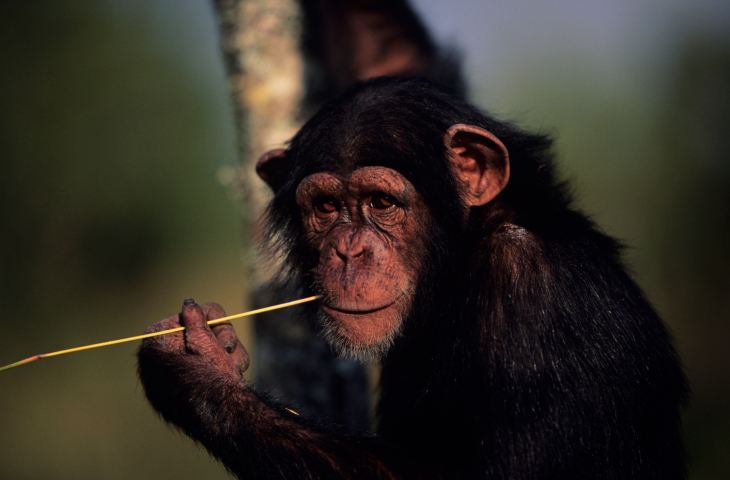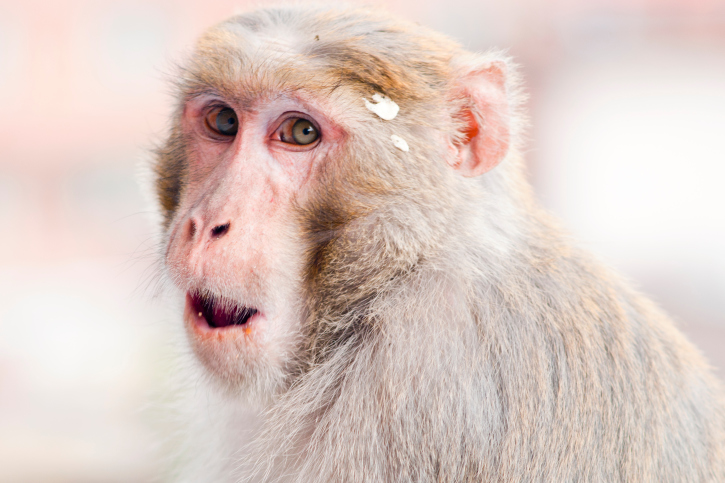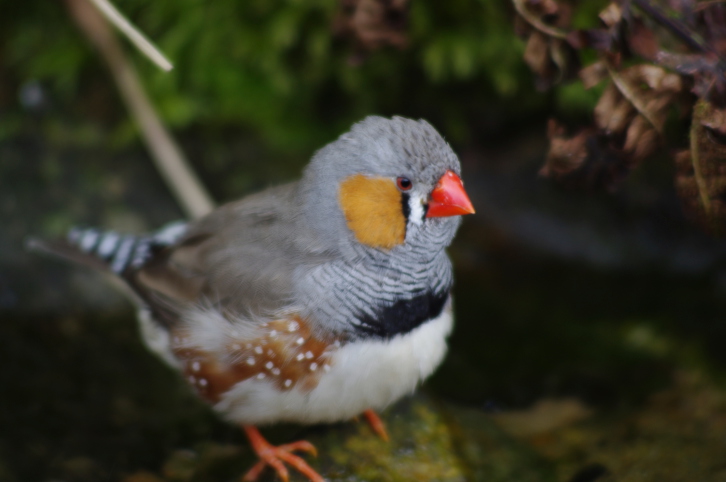(单词翻译:单击)
Animals continue to amaze us by displaying types of intelligence we once thought were reserved for humans. So the next time your partner fakes it or someone steals behind your back, remember—the animals did it first.
现如今,动物们正不断通过做一些我们原以为只有人类能做的事情来让我们大吃一惊。所以,下次要是你的朋友在模仿或者在你背后偷偷摸摸,记得告诉他,这是动物首创的。
10.Chimpanzees Start Fashion Trends
10.黑猩猩开启时尚潮流

We humans often admire individuality. Paradoxically, we also make fun of people who don't follow the latest fashion trends in our society. Maybe we share our copycat tendencies with chimpanzees.
我们人类经常赞美个性。矛盾的是,我们也取笑社会中那些不追赶最新潮流趋势的人。或许,我们和黑猩猩一样都有着盲目模仿的倾向。
According to a study published in Animal Cognition, the copycat behavior of chimps leads to new traditions that are often specific to only one group of the animals. It's similar to a new fashion trend emerging in their society.For example, one of the researchers observed a female chimp, Julie, repeatedly sticking a strawlike piece of grass in one or both of her ears. Over time, other chimps in Julie's group copied her behavior. A couple of the animals continued putting grass in their ears even after Julie died. It's like your uncle wearing his hair in a mullet after the 1980s died. Some chimps (and people) just can't give up their traditions even when they go out of style.The researchers concluded that the grass-in-the-ear behavior wasn't a random event among the chimps. They actively learn from one another and continue behaviors they find rewarding, even after the originator dies.
一项发布在《动物认知》上的研究表示黑猩猩盲目模仿的行为会产生新的传统,而这些传统只针对黑猩猩当中的一部分。这与它们社会出现一种新的传统是相似的。比如说,一个研究者观察了一只名叫朱莉的母猩猩,她用一根像稻草一样的草在她的一只或者两只耳朵里反复地掏来掏去。随着时间的推移,朱莉所在的群体中的其他猩猩模仿了她的掏耳行为。尽管在朱莉死了之后,还是有几只猩猩不停地模仿朱莉,把草放到耳朵里。这就像你的叔叔留着一种在20世纪80年代就已经过时的乌鱼发型一样,一些猩猩和人不会放弃他们的传统,即使这些传统过时了。研究人员总结道,用草掏耳朵这种行为在这群黑猩猩中并不是随机事件。它们积极主动地互相学习并且保持它们觉得有益的行为,即使这种行为的创造者已经死了。
9.Dogs Remember The Scents Of People They Love Better Than The Scents Of Other Dogs
9.比起记住同类的气味,狗更能记住它们所喜欢的人的气味

One whiff of the cologne or perfume of someone we love may trigger an immediate emotional reaction in us. For dogs, with their heightened sense of smell, the reaction is even stronger. As published in the journal Behavioral Processes, researchers set out to see how dogs would respond to the scents of absent humans and dogs, both familiar and unfamiliar.
一点点古龙香水或者我们所爱的人身上的香味就能立即引起我们的情绪反应。对狗狗而言,它们有着灵敏的嗅觉,因此它们的反应也更强烈。正如《基本行为过程》上所发表的,研究者们想要看看狗会对不在场的人和狗的气味做出怎样的反应。其中包括它们熟悉的或不太熟悉的。
Twelve dogs of various breeds were each presented with five different scents while undergoing a magnetic resonance imaging scan of the brain. The scents were taken from the test dog itself, a dog and a human that lived in the same house as the test dog, an unfamiliar dog, and an unfamiliar human. None of the scent donors were present during the test.All five scents caused a similar response in the areas of the brain that detect smells. But in the area of the brain associated with emotion, the dogs responded most positively to familiar humans—even more so than to familiar dogs. However, the reward response occurred only with familiar humans. The researchers weren't sure if that response was based on food, play, or other factors. They concluded that dogs remember us even when we're not there.
给12条不同品种的狗,闻5种不同的气味,在此过程对其进行核磁共振,观察它们的大脑。这些气味来自测试狗自身。把处在同一间房子的一条狗和一个人作为一组,其中人与狗是互不熟悉的。气味的提供者也不会出现在测试中。这5种气味在大脑探测气味的部位都引起了相似的反应。但是在与情绪关联的大脑区域中,测试狗则对熟悉的人的气味都做出了积极的反应,甚至比对其熟悉的狗的气味做出的反应更加强烈。然而狗的奖励反应只会在它闻到熟悉的人,也就是它喜欢的人的气味时才会发生。研究者们无法确定狗的这种反应是否是建立在食物与游戏,或者其他因素的基础上。他们得出结论:即使我们不在那里,狗也能记住我们。
8.Songbirds Who Sing Less Have Better Memories
8.唱得少的鸣鸟记忆力更好

According to researchers from Duke University, male song sparrows experience a trade-off between the number of songs they sing and the strength of their other mental abilities. Furthermore, female song sparrows may use this fact to judge the mental abilities of their potential mates.
杜克大学的研究者称雄性北美歌雀会在它们唱的歌曲数量与心理能力之间进行权衡。而且雌性北美歌雀会利用这一点来对它们未来伴侣的心理能力进行判断。雌性歌雀有足够的理由挑剔。当对雄性歌雀解决觅食困境的能力进行测试时发现,唱得少的歌雀解决困境的速度是最快的,它们记得食物在哪儿。
The females may have good reason to be judgmental. When male song sparrows' ability to solve food-finding puzzles is tested, the birds singing fewer songs learned to solve the puzzles the quickest. They remembered where the food was. The researchers believe this shows that there's a trade-off between learning songs and other mental abilities, such as spatial memory. Song learning and spatial learning are controlled by different areas of the bird's brain. So as the song sparrow's brain develops, if more resources are used to learn songs, there are fewer resources left for other mental abilities like spatial memory.This doesn't apply to all birds, though. For example, starlings that sang more songs were quicker at solving spatial puzzles.
研究者们认为,这表明了北美歌雀学习唱歌与像空间记忆力这种心理能力之间存在平衡的关系。鸟儿对歌曲的学习以及对空间的记忆都是由其脑部不同区域控制的,北美歌雀的大脑发育也是如此。如果更多的资源用来学习歌曲,那么像空间记忆这种心理智能的发展所需的资源则会更少。但这也并不是对所有的鸟类都适用。比如说椋鸟,它们歌唱得越多,解决空间问题的速度则更快。
7.Monkeys Know When To Double Down—Or Do They?
7.猴子知道什么时候投双倍注?这是真的吗?

It's well-known that humans often see patterns in random events, believing in winning and losing streaks when they gamble. Well, it turns out that monkeys love to gamble, too. So researchers from the University of Rochester decided to study three rhesus monkeys to see if they also share our belief in winning streaks.
众所周知,人们往往会在随机事件中看到模式。他们相信在赌博时会有连赢或者连败的存在。嗯,原来猴子也爱赌。因此来自罗切斯特大学的研究者决定通过研究三只猕猴来看看它们是否和我们人类一样相信连赢的存在。
The scientists designed a fast-paced, computerized game where each monkey would pick right or left and get a reward if they were correct. There were three types of play. Two had clear patterns of correct answers. The third was totally random.In the types of play with patterns, the monkeys caught on to the correct answer quickly. But even in random play, the monkeys favored one side as though they expected a winning streak. This continued for weeks, with over 1,200 opportunities in each sequence.The researchers believe this study shows that we humans have inherited our bias toward seeing patterns in random events. They think this behavior originally evolved to help our ancestors recognize real patterns to find food in the wild.
科学家们设计了一个快节奏的由电脑控制的游戏,在游戏中每只猴子只要选择左或右即可,如果他们的选择是正确的则可以得到奖励。这个游戏有三种类型,其中两种有正确答案模式,另外一种则是完全随机的。在玩其中带有答案模式的游戏时,猕猴们能快速地指出正确答案,在玩答案随机的游戏时,它们的选择则偏向某一边,好像它们期待出现连赢一样,这一情况持续了数周,每一种随机序列中有1200多个随机变量。研究者们认为这一研究表明我们人类继承了一种偏向意识,即在随机事件中看到模式。他们认为这种偏向最原始的是帮助人类祖先识别真正的模式,从而使他们在野外找到食物。
6.Zebra Finches Fake It To Make It
6.斑胸草雀善于伪装

Unlike male song sparrows, zebra finches aren't giving their potential mates the opportunity to judge. If a zebra finch is sick, it will fake being healthy in front of other zebra finches, especially if there's a chance to mate. No word on what else they're faking.
不像雄性歌雀,斑胸草雀不会给它们的潜在配偶评判的机会,如果生病了,它会在其他同类面前装作很健康的样子,在它有机会结交配偶的情况下尤其如此。我们不了解它到底在装什么。
A review by a researcher from the University of Zurich found that same behavior to be true of other animals as well. From rodents to birds to monkeys, many animals will alter their behavior depending on their social situation. Usually, the animals will consume less and rest more when they're sick. This protects the life-sustaining processes they need to fight infections and recover.But in front of their young, possible mates, or intruders threatening their territories, the animals change their priorities and hide their illnesses. That behavior might seem amusing or clever—until you realize how these actions affect the detection and spread of diseases among both animals and humans.
来自杜克大学的一名研究者在其发表的评论中认为这种行为对其他动物也适用,从啮齿类动物到鸟类、猴子,很多动物都会根据它们所处的社会情境相应地改变它们的行为。通常情况下,如果生病了,它们则会多休息,减少体能消耗。这样就保障了让其生命得以维持的过程,并以此来抵抗传染性疾病,恢复健康。但是在其他年轻的,有可能成为其配偶的斑胸草雀面前,或者面对威胁到其领地的入侵者时,它们则会改变重点,并隐藏它们的疾病。在你明白这些行为是怎样在人类和动物中对疾病的侦查和传播做出影响之前,它们的这种行为看起来有趣,或者说聪明。
翻译:李清海 来源:前十网


